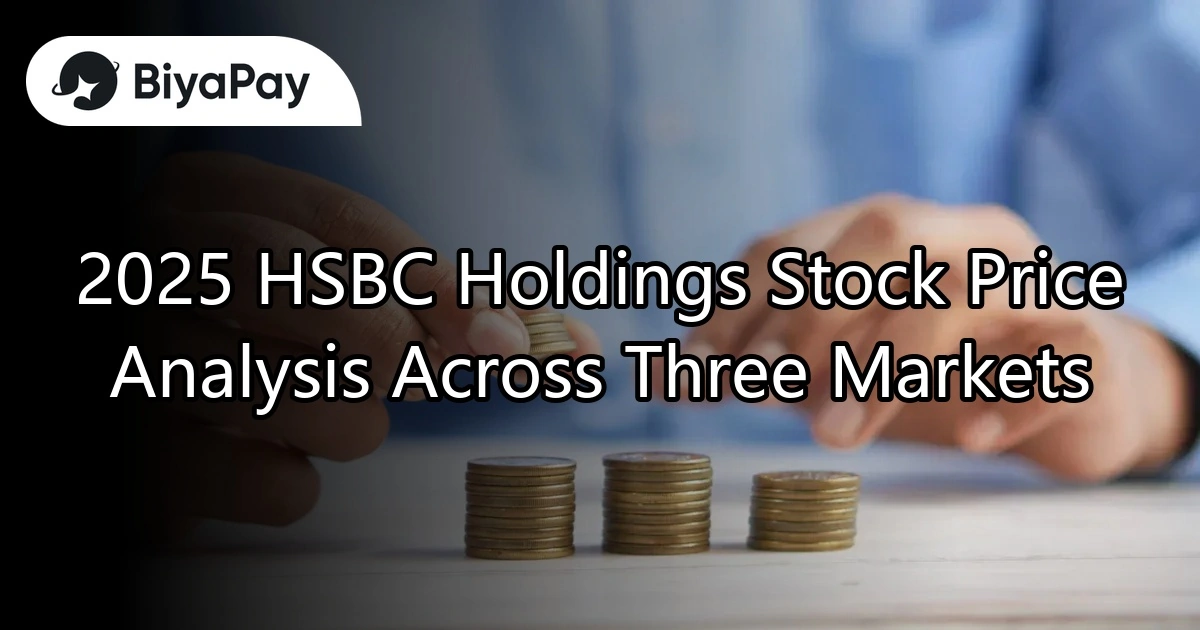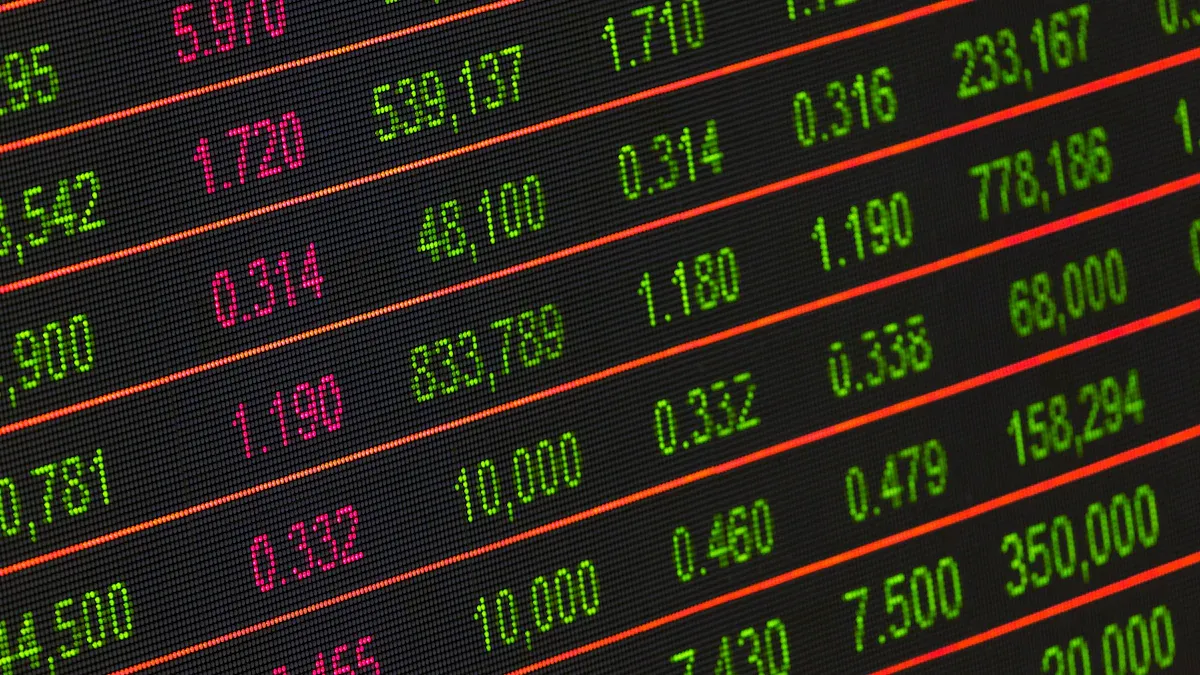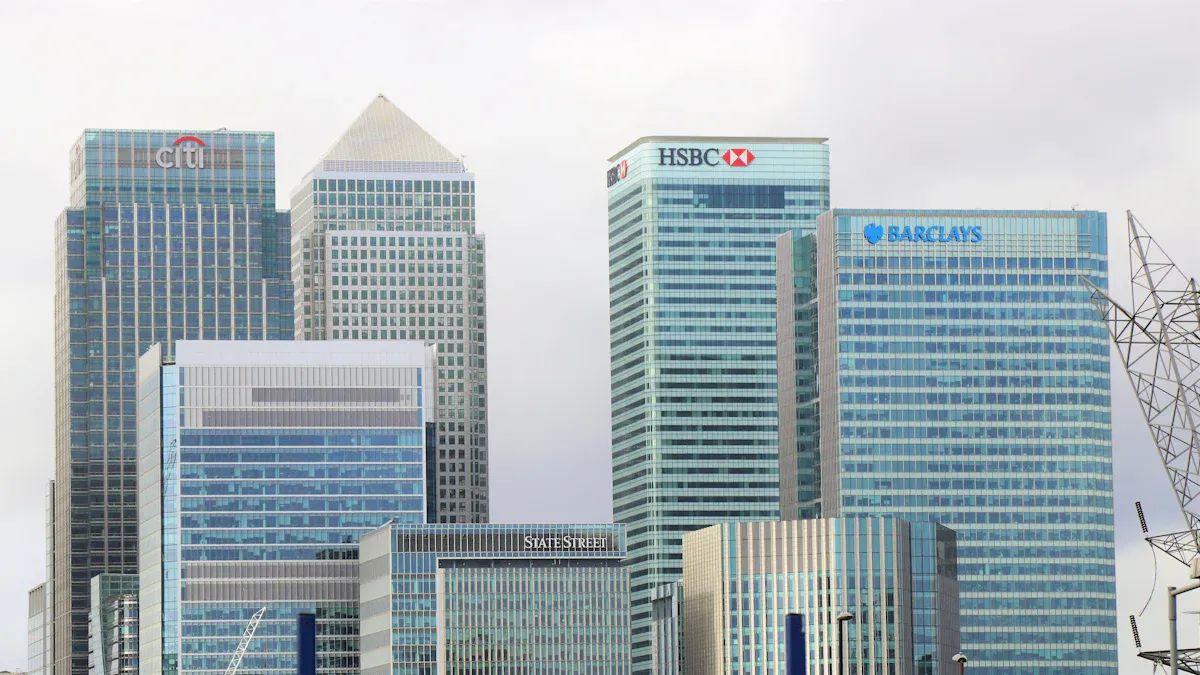- EasyCard
- Trade
- Help
- Announcement
- Academy
- SWIFT Code
- Iban Number
- Referral
- Customer Service
- Blog
- Creator
2025 HSBC Holdings Stock Price Analysis Across Three Markets

Image Source: pexels
In 2025, HSBC Holdings’ stock price performance in the three major markets is as follows: Hong Kong (0005.HK), the United States (HSBC), and London (HSBA).
The table below lists the latest stock prices and exchange rates converted to U.S. dollars (USD) to help readers quickly compare price differences across the three markets.
| Market | Latest Price | Exchange Rate (Local Currency/USD) | Converted Price (USD) |
|---|---|---|---|
| Hong Kong | HKD 65.00 | 7.80 | 8.33 |
| United States | USD 8.50 | 1 | 8.50 |
| London | GBP 6.80 | 1.27 | 8.64 |
Investors focusing on HSBC Holdings’ stock prices in different markets can observe slight price differences.
These differences reflect factors such as market liquidity, exchange rates, and trading hours.
Key Takeaways
- HSBC Holdings’ stock prices in Hong Kong, the U.S., and London are similar, but slight differences arise due to exchange rates and market demand.
- The Hong Kong market has the highest trading volume and liquidity, making it suitable for large transactions; U.S. ADRs facilitate dollar-based settlements, while the London market is favored by European investors.
- Exchange rate fluctuations, trading hours, and investor demographics influence price differences across the three markets, and investors should closely monitor these factors.
- Major events and company policies, such as stock buybacks and stable dividends, help boost stock prices and investor confidence.
- Investors should choose the most suitable market based on their needs, risk tolerance, and trading hours, while paying attention to exchange rate and liquidity risks.
HSBC Holdings Stock Price Comparison Across Three Markets

Image Source: pexels
Stock Price and Exchange Rate Conversion
Investors often compare HSBC Holdings’ stock prices across different markets.
The table below summarizes the 2025 HSBC Holdings stock prices in Hong Kong, the U.S., and London, all converted to Hong Kong dollars (HKD) (calculated at 1 USD = 7.80 HKD and 1 GBP = 9.90 HKD) for clarity.
| Market | Latest Price (Original Currency) | Exchange Rate (to HKD) | Converted Price (HKD) |
|---|---|---|---|
| Hong Kong | HKD 65.00 | 1 | 65.00 |
| United States | USD 8.50 | 7.80 | 66.30 |
| London | GBP 6.80 | 9.90 | 67.32 |
This table shows that HSBC Holdings’ stock prices across the three markets are quite close after exchange rate conversion.The U.S. market price is slightly higher than Hong Kong, while the London market is slightly higher than the other two.
These differences mainly stem from exchange rate fluctuations and market supply and demand.
Trading Volume and Liquidity
In addition to stock prices, trading volume and liquidity are key concerns for investors.
The trading volume and liquidity differences across the three markets are significant, affecting the ease of buying and selling HSBC Holdings’ stock.
| Market | Daily Average Trading Volume (10,000 Shares) | Liquidity | Market Cap (Billion USD) | P/E Ratio | Dividend Yield |
|---|---|---|---|---|---|
| Hong Kong | 2,500 | High | 210 | 9.5 | 6.2% |
| United States | 350 | Medium | 210 | 9.5 | 6.2% |
| London | 1,200 | Medium-High | 210 | 9.5 | 6.2% |
- The Hong Kong market has the highest trading volume and liquidity. Investors can more easily conduct large transactions with smaller price fluctuations when buying or selling HSBC Holdings’ stock.
- In the U.S. market, HSBC Holdings trades as American Depositary Receipts (ADRs) with lower trading volume and medium liquidity. This setup is convenient for U.S. investors, but prices may sometimes diverge from those in Hong Kong and London.
- The London market, where HSBC Holdings is registered, has trading volume and liquidity between Hong Kong and the U.S. Many European investors choose to trade in the London market.
Tip: High trading volume indicates an active market; high liquidity allows investors to buy or sell stocks more easily at reasonable prices.
Market capitalization, P/E ratio, and dividend yield are generally consistent across the three markets, as these metrics reflect the company’s overall operating condition.
Investors can choose the appropriate market based on their trading habits and location.
Price Difference Analysis
Premium and Discount
Investors often notice that HSBC Holdings’ stock prices in Hong Kong and London are not exactly the same after exchange rate conversion.Based on 2025 data, the Hong Kong stock price is approximately USD 8.33, while the London market is around USD 8.64.The London market price is about 3.7% higher than Hong Kong’s, a phenomenon known as a “premium.”
If the London price were lower than Hong Kong’s, it would be called a “discount.”Premiums or discounts arise mainly from market supply and demand, capital flows, and exchange rate fluctuations.When investor demand is higher in a particular market, the stock price in that market is likely to show a premium.
HSBC Holdings in the U.S. market trades as ADRs.ADR prices typically reference Hong Kong and London market prices but may also show differences.For example, in 2025, the U.S. ADR price is USD 8.50, slightly higher than Hong Kong but lower than London.Some investors may exploit these price differences for arbitrage opportunities.However, actual arbitrage requires considering transaction fees, exchange rate changes, and trading time differences.
Trading Hours Impact
The trading hours of the three markets differ.The Hong Kong market operates during Asian hours, the London market during European hours, and the U.S. market during American hours.These different trading hours can cause temporary price differences for HSBC Holdings’ stock across markets.When one market is closed, price changes in other markets cannot be immediately reflected, which may lead to premiums or discounts.
Additionally, liquidity affects prices.Markets with high trading volume have more stable prices and smaller spreads, while markets with lower trading volume may experience larger price fluctuations and wider spreads.
Investors should pay attention to the trading hours and liquidity of different markets and choose the trading timing and market that best suits them.
Influencing Factors
Exchange Rate Fluctuations
Exchange rate changes directly affect the comparison of HSBC Holdings’ stock prices across the three markets.When the USD exchange rate against HKD or GBP changes, investors will notice price differences for the same company across markets.For example, when the USD appreciates, the London market stock price, when converted to USD, may rise.
This situation attracts arbitrage capital flows, further affecting prices in each market.Investors should closely monitor the exchange rate trends of USD against HKD and GBP, as these data impact investment decisions.
Economic and Policy Factors
Regional economic conditions and regulatory policies also affect HSBC Holdings’ stock price.
When economic data in Hong Kong, the UK, or the U.S. performs well, investor confidence rises, and stock prices tend to increase.Conversely, during economic downturns, stock prices may fall.
Changes in regulatory policies can also have an impact.
For example, if Hong Kong regulators adjust bank capital requirements, it may affect HSBC Holdings’ capital utilization and dividend policies.In 2025, HSBC Holdings continues to promote its share buyback program and maintain a stable dividend policy, which helps boost investor confidence.
Investor Demographics
The investor demographics in the three markets vary.The Hong Kong market is dominated by local and Asian investors, the London market has a large number of European institutional investors, and the U.S. market attracts North American investors through ADRs.Different investor preferences for risk and return affect market capital flows and price volatility.When investors in a particular market actively buy HSBC Holdings’ stock, the stock price in that market may show a premium.
Investors should choose the appropriate market based on their needs and pay attention to investor behavior in each market.
Reminder: Exchange rates, economic policies, and investor demographics collectively influence HSBC Holdings’ stock price. Investors should analyze from multiple perspectives and make rational judgments.
HSBC Holdings Stock Price Trends

Image Source: pexels
Past Year Comparison
From 2024 to 2025, HSBC Holdings’ stock price showed different trends across the three markets.
The Hong Kong market experienced relatively low price volatility, remaining between USD 8.2 and USD 8.4.The U.S. ADR price saw a slight increase due to USD exchange rate fluctuations.The London market performed most notably, with the stock price rising from USD 8.1 to USD 8.6 since the beginning of 2025, showing significant gains.
This trend indicates that European investors have high expectations for HSBC Holdings’ future growth, with capital inflows driving the London market price upward.
The recent rise in the London market reflects investor confidence in the company’s capital return policies and cost control strategies.
Impact of Major Events
Major events often affect HSBC Holdings’ stock price and trading volume.
The following are key events and their impacts over the past year:
- In 2023, the significant devaluation of the Argentine peso led to a reduction of approximately USD 500,000,000 in the company’s pre-tax profit, causing a short-term stock price drop and a noticeable increase in trading volume.
- In 2023, the company distributed approximately USD 19,000,000,000 in capital returns to shareholders, including USD 7,000,000,000 in stock buybacks, reducing the number of shares by over 4%, which led to a stock price increase and heightened market trading activity.
- The company announced plans to continue stock buybacks of up to USD 2,000,000,000 and is considering distributing special dividends, which help stabilize or boost HSBC Holdings’ stock price.
- The company emphasized cost control and growth expectations, which enhanced investor confidence, further reflected in stock price and trading volume changes.
Investors can gauge market sentiment and future trends by observing stock price and trading volume data during major events.
Investment Recommendations
Market Selection
When choosing to trade HSBC Holdings’ stock, investors should make decisions based on their needs and market characteristics.Each of the three markets has its advantages and limitations, as summarized below for reference:
| Market | Advantages | Limitations | Suitable For |
|---|---|---|---|
| Hong Kong | High liquidity, large trading volume, stable prices | Trading hours limited to Asian time zone | Large transaction investors, Asian investors |
| United States | ADRs convenient for U.S. investors, USD settlement | Lower trading volume, occasional price differences | North American investors, those preferring USD assets |
| London | European time zone, registered location, medium-high liquidity | Greater impact from exchange rate fluctuations | European institutional investors |
Investors prioritizing liquidity and price stability should choose the Hong Kong market.The U.S. ADR market is suitable for those preferring USD settlement or residing in the Americas.The London market offers trading convenience in the European time zone, ideal for local or European investors.
Recommendation: Investors should select the most suitable market based on their location, trading hour needs, and capital size.
Additionally, exchange rate risk is an important consideration.HSBC Holdings’ stock prices in the U.S. and London markets are affected by fluctuations in USD and GBP against HKD.Investors unfamiliar with exchange rate changes should opt for their local currency market to reduce exchange rate-related risks.
Risks and Considerations
Although all three markets allow trading of HSBC Holdings’ stock, several risks and considerations remain:
- Price Differences and Arbitrage Risks
Price differences often exist between U.S. ADRs, Hong Kong, and London markets. Some investors may attempt arbitrage to exploit these differences. However, actual arbitrage requires considering transaction fees, taxes, exchange rate fluctuations, and trading time differences. Failure to accurately account for costs may lead to losses instead. - Liquidity Risk
The Hong Kong market has the highest liquidity, allowing investors to trade close to market prices. The U.S. ADR and London markets have relatively lower liquidity, and large transactions may cause significant price fluctuations. Investors should assess their transaction size and choose the appropriate market. - Exchange Rate Risk
Investors trading in non-local currency markets bear the risk of exchange rate fluctuations affecting their returns. For example, changes in USD or GBP against HKD directly impact final investment returns. Investors should closely monitor major currency exchange rate trends and consider hedging tools. - Trading Hours and Information Gaps
The trading hours of the three markets differ, and the speed of information dissemination varies. When one market is closed, price changes in other markets cannot be immediately reflected, leading to temporary price differences. Investors should pay attention to market opening and closing times to avoid misjudgments due to information gaps. - Regulatory and Policy Risks
Regulatory policies vary across regions and may affect HSBC Holdings’ stock price. For instance, adjustments to Hong Kong’s banking regulations or changes in U.S. or UK financial regulations could impact the company’s operations and stock price. Investors should continuously monitor relevant policy developments.
Reminder: Investors should diversify investments across different markets based on their risk tolerance and regularly review their portfolios to mitigate the impact of single-market volatility.
Each of the three markets has its unique characteristics. The Hong Kong market offers high liquidity, suitable for large transactions. U.S. ADRs facilitate USD settlement. The London market is favored by European investors. Investors should choose the appropriate market based on their needs and risk tolerance. It is recommended to continuously monitor market changes, analyze rationally, and make informed decisions.
FAQ
Why do HSBC Holdings’ stock prices differ across the three markets?
Differences in market supply and demand, exchange rate fluctuations, and trading hours cause price variations across the three markets. Investors should compare prices in each market to choose the most suitable one.
How should investors choose the right market to trade HSBC Holdings?
Investors can choose based on their location, trading hours, liquidity, and exchange rate risks. The Hong Kong market offers high liquidity, U.S. ADRs suit USD-based assets, and the London market is ideal for European investors.
How do exchange rate changes affect investment returns?
Exchange rate fluctuations impact the converted stock price results across markets. If USD or GBP appreciates against HKD, investors’ final profits may increase or decrease.
What are the characteristics of HSBC Holdings’ dividend policy?
HSBC Holdings maintains a stable dividend policy and regularly conducts stock buybacks. These measures help boost investor confidence and stabilize the company’s stock price.
How does liquidity differ across the three markets?
The Hong Kong market has the highest trading volume and liquidity. The London market has medium-high liquidity, while the U.S. ADR market has lower trading volume. Higher liquidity allows investors to trade more easily.
Investing in HSBC stock across Hong Kong, US, and London markets? With BiyaPay, you can trade US and Hong Kong stocks like HSBC using **USDT **, no offshore account needed, with a seamless exchange process. Enjoy real-time conversion of 30+ fiat currencies (like USD, HKD) and 200+ cryptocurrencies (like USDT, BTC) at fees as low as 0.5%, outpacing traditional brokers. Licensed by FinCEN (USA) and FINTRAC (Canada), BiyaPay ensures secure trading.
Sign up in minutes with a beginner-friendly platform. Join BiyaPay now to streamline your investments, and start today to unlock global market potential!
*This article is provided for general information purposes and does not constitute legal, tax or other professional advice from BiyaPay or its subsidiaries and its affiliates, and it is not intended as a substitute for obtaining advice from a financial advisor or any other professional.
We make no representations, warranties or warranties, express or implied, as to the accuracy, completeness or timeliness of the contents of this publication.




Contact Us
Company and Team
BiyaPay Products
Customer Services
is a broker-dealer registered with the U.S. Securities and Exchange Commission (SEC) (No.: 802-127417), member of the Financial Industry Regulatory Authority (FINRA) (CRD: 325027), member of the Securities Investor Protection Corporation (SIPC), and regulated by FINRA and SEC.
registered with the US Financial Crimes Enforcement Network (FinCEN), as a Money Services Business (MSB), registration number: 31000218637349, and regulated by FinCEN.
registered as Financial Service Provider (FSP number: FSP1007221) in New Zealand, and is a member of the Financial Dispute Resolution Scheme, a New Zealand independent dispute resolution service provider.



















